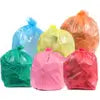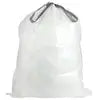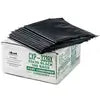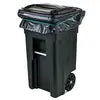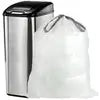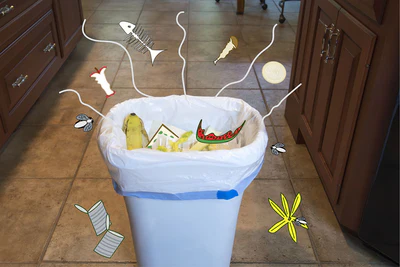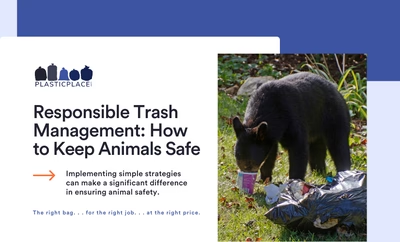Source: Tatjana Baibakova/Shutterstock.com
We hope you’ve finished eating. Because things are about to get gross.
We’re talking about your used cooking grease. That congealed goo with breading bits that smells like fish can do some nasty things to pipes. And not just your pipes. Your used cooking grease can take down your city’s entire sewer system.
We’ll offer up solutions for how to dispose of cooking grease, from the simple to the sustainable. But, first, we’ll plant the seed for your nightmares tonight as we tell you about a burgeoning menace lurking in the sewers.
Make sure you buy Simplehuman garbage bags before you go to sleep so you don’t forget!
Find Simplehuman Garbage Bags Online
Fatbergs Are Coming to Your City
Actually, they’re probably already there. You’re just blissfully unaware, thanks to the quiet heroics of your city’s sanitation workers. What are fatbergs, you ask?
Think about all the waste that goes into your sewer system. And we’re not just talking about the drain in your kitchen sink. Obviously, the sewer system was built to handle conventional material. But, nowadays, many residents are sending inappropriate stuff into the sewer.
Two items, in particular, form together to create an unholy alliance: flushable wipes and cooking grease. The resulting colossus expands, fed by a steady diet of foul waste. If the fetid Kraken is left to grow in its cesspool unchallenged, bad things can happen. Very, very bad things.
That’s just what happened in cities across the U.S. as the pandemic sent us to our kitchen tables to work and to our kitchen stoves to whip up enough comfort food to get us through. The North Charleston Sewer District spends $360,000 per year fighting fatbergs — a 44 percent increase post-pandemic.
If it weren’t for the fearless gallantry of sanitation workers like those in Charleston, cesspool Krakens would end civilization as we know it. How big can these monstrosities become? A 300-ton fatberg stretching a half mile brought one English city to its knees in 2019.
Always dispose of flushable wipes and cooking grease in black garbage bags so there’s no chance you mistake it for recycling.

Source: Africa Studio/Shutterstock.com
Non-Evil Methods to Dispose of Cooking Grease
You don’t have to give up fried chicken and steakhouse burgers. Simply keep nefarious forces at bay by vowing to never pour cooking grease down the drain. Use the following non-evil methods to dispose of cooking grease:
- Trash it. The simplest method of dealing with cooking grease is letting it cool and putting it in a container, and then tossing the container in drawstring trash bags. As simple as trashing grease is, other methods are more environmentally friendly.
- Reuse it. Sometimes it seems like recycling gets all the attention. But we love all the Rs of sustainability. You can reuse cooking grease up to eight times. Strain the food bits from your cooking grease using a cheesecloth. Storing the grease in a mason jar will help keep it fresh. You’ll know the grease isn’t usable when it begins to smell rancid.
- Repurpose used cooking oil. After you’ve finished reusing it, you can repurpose cooking grease for common household applications. Used cooking oil can lubricate squeaky doors or prevent rust on metal. Prevent grass clippings from clogging your lawnmower by applying used cooking grease to the blades.
- Recycle your used cooking grease if a facility for doing so is nearby. Used cooking grease can be recycled into a variety of materials, from biodiesel to soap. Call your local recycling center to see if facilities for recycling cooking grease exist near you.

Source: GEMINI PRO STUDIO/Shutterstock.com
Don’t let your used cooking grease grow into a sanitation worker’s worst nightmare. Fend off fatbergs by resolving to never, ever pour used cooking grease down your kitchen drain. You can always let it cool and then trash it. But as one defending your city from cesspool Krakens, maybe you can find nobler ways of discarding cooking oil. Whether you trash it or recycle it, always do your part to dispose of cooking grease responsibly.
 4.9 out of 5
4.9 out of 5 













